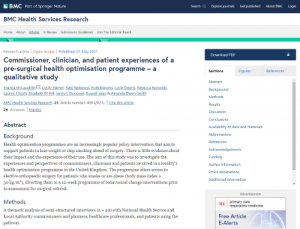Getting Fit for Surgery: evaluating a pre-surgery ‘health optimisation’ policy
Across the country, ‘health optimisation’ programmes have been introduced to offer support to patients in the lead up to having surgery. The most common type of programmes focus on weight loss and smoking for patients due to have a hip or knee replacement.
These programmes vary a lot depending on which region the patient lives in. Some are very strict and require patients to lose a certain amount of weight or to prove that they have stopped smoking before they can be referred for surgery. In other regions there are no such requirements, and patients may be offered general advice on healthy lifestyles. Some regions offer intensive, one-to-one support to help patients make changes, while in other regions patients may have to make lifestyle changes on their own.
These health optimisation programmes aim to:
- Improve patient health before surgery, for safer surgery and better patient outcomes
- Reduce the number of patients who need surgery
- Trigger long-term lifestyle changes in patients at a key moment in their lives when they are motivated to improve their health
Though some areas of the country have had health optimisation programmes in place for many years and their use is increasing, their effects haven’t really been evaluated properly. This means there isn’t much evidence to show whether they are beneficial for patients and health services or offer value for money. There is also concern that they might have harmful effects, like making access to surgery more difficult for certain groups in society, such as minority ethnic groups with higher levels of obesity, or carers who struggle to find time to take up support to stop smoking.
The Bath and North East Somerset Clinical Commissioning Group (CCG) (now Bath and North East Somerset, Swindon and Wiltshire CCG) introduced an ambitious health optimisation policy in late 2017. The programme was called ‘Getting Fit for Surgery’ and affected access to hip and knee surgery for patients who smoke, or who have obesity. Unless they urgently needed surgery or are another exceptional circumstance, once their GP referred them these patients were diverted to a ‘health optimisation’ pathway for 12 weeks. They were offered support from a healthy lifestyles service to help them lose weight or stop smoking. At the end of the 12 weeks, they were re-assessed to see if they still needed surgery. Patients didn’t have to take up the offer of support, and there was no penalty if they did not lose weight or stop smoking, but they still had to wait an additional 12 weeks before surgery.
Project aims
ARC West worked in collaboration with Bath and North East Somerset CCG to examine the impact of the Getting Fit for Surgery policy. We completed this work in two parts – the first looked at the number of patients using the support on offer, what changes could be measured, and whether there were any differences in the number of patients needing surgery. In the second part, we investigated the perspectives and experiences of patients and professionals who were involved in the Getting Fit for Surgery programme, to:
- understand the perspectives on the purpose of the programme of the professionals involved with designing and planning it
- see what the experiences of the healthcare and lifestyle professionals delivering the programme to patients were like
- understand the perspectives and experience of the patients in the Getting Fit for Surgery programme
What we did
We interviewed:
- 13 professionals who had been involved in designing or delivering Getting Fit for Surgery. This was a mixture of commissioners, doctors, physiotherapists, and lifestyle professionals
- 7 patients who had experienced Getting Fit for Surgery. Participants varied in their choice over whether to accept the support on offer and of whether or not they chose to go ahead with surgery following their 12 weeks of Getting Fit for Surgery
We worked with the organisations involved in each part of the health optimisation process (identifying patients, referring them for weight management or stop smoking support, providing the support) to see what information they routinely collect. We arranged for this information to be combined with NHS information on the healthcare that patients had received over the year after their referral into the programme. After it had been anonymised, we analysed the overall information to see how many patients took up the offer of support with weight management or smoking, and whether there was a difference between those who did and not take up the offer of support.
How we involved people
To help us design the study we talked to the patient and public involvement group at ARC West. Their input was particularly valuable in deciding on the priority areas for us to focus on in the interviews.
What we found and what this means
Enough data is routinely collected on patients in the health optimisation programme to give commissioners and researchers some useful information about the scale and effects of the programme. However, we found that bringing this data together is a complicated and lengthy process due to the number of organisations involved. We also found that there was a lot of missing data regarding smoking and ethnicity, and a lack of information on the long-term health outcomes of patients in the programme. Long-term data is important when trying to establish whether the programmes represent good value for money and whether they improve patients’ general health and wellbeing.
The information available showed that around a third (37 per cent) of hip and knee patients had obesity or were current smokers and were therefore required to wait an extra 12 weeks before surgery. Only three out of ten (28 per cent) of these patients accepted the offer of support to lose weight or stop smoking. Those accepting support lost more weight on average than those who did not (-1.8 body mass index points compared to -0.5), and fewer of these patients went on to have joint surgery (49 per cent vs 61 per cent). The cost of the health optimisation programme was £57 per patient for weight management. These results suggest that health optimisation programmes may have positive effects for patients and reduce their need for surgery. This was particularly important as the health optimisation patients were relatively less affluent than hip and knee patients overall.
Health optimisation programmes were acceptable to the participants we interviewed in the context of hip and knee surgery. They felt that they offer a chance to support both short term weight loss or stopping smoking before surgery, and longer-term sustained changes to lifestyle and health after surgery. Patients in this study expected their doctors to raise weight management and smoking with them at the point they were referred to surgery. They didn’t find this problematic, with some stating they would welcome the offer of support at this point.
Health optimisation was successfully introduced as part of the region’s hip and knee surgery arrangements but had failed to be implemented for a wider range of conditions because not many people were referred to it. It was suggested that health optimisation during the ‘usual waiting time’ for surgery may be most acceptable to professionals and patients. The success of health optimisation was thought likely to be reliant on healthcare professionals’ support for the programmes and how well they are communicated to patients. Patients we interviewed generally hadn’t received much explanation of the programme and didn’t feel that they understood it well.
Patients and professionals supported the continuation of Getting Fit for Surgery and recognised the likely health and wellbeing benefits for most patients. They also accepted the money-saving reasons to introduce these programmes, to reduce the number of people needing surgery. They highlighted the need to personalise the support to patients to help them meet their goals and avoid creating inequalities.
Our recommendations from the insights from this project are:
- Ensure that the communication of the intent and nature of the health optimisation pathway is positive and individualised at the point of first patient contact with primary care. Clinicians should have confidence that most patients are likely to expect and welcome an offer of support for weight loss or stopping smoking in this context. Patients knowing that it may reduce the need for surgery need not be a problem.
- Address patient uptake of health optimisation programmes by widening the choice of support on offer and including evaluation of new programmes. The group-based approach used in Getting Fit for Surgery may be acceptable to many, but those wanting an individualised approach have fewer options. Consideration should be given to offering support matched to groups experiencing health inequalities.
- Improvements in the quality and availability of the information routinely collected on patients in health optimisation programmes would provide better insight into any longer-term benefits or unintended consequences of the programmes, and how to address the low numbers of patients taking up the support on offer with weight management and smoking.
What next?
These findings have been used by those responsible for the Getting Fit for Surgery programme, to help improve it and shape it for the future. The results of this study can also be used to inform the introduction and content of health optimisation policies in other health care systems.
Further work to investigate the effects of the different types of health optimisation programmes across the country is being undertaken as part of an NIHR Doctoral Research Fellowship for Dr Joanna McLaughlin, supervised by Professor Andy Judge, Dr Ruth Kipping, Dr Hugh McLeod and Dr Amanda Owen-Smith. This research will provide evidence to guide the choice and use of health optimisation programmes in the future. Further work is needed to follow up patients for longer, to see if any weight loss or change in smoking achieved before surgery is maintained over the years.
Paper

Commissioner, clinician, and patient experiences of a pre‐surgical health optimisation programme – a qualitative study
Read the paperLead collaborators
- Joanna McLaughlin, University of Bristol
- Lucie Owens, Bath and North East Somerset, Swindon and Wiltshire Integrated Care Board
- Amanda Owen-Smith, University of Bristol
- Ruth Kipping, University of Bristol
- Rebecca Reynolds, Bath and North East Somerset Council
- Cecily Palmer, University of Bristol
ARC West Staff
Professor Russ Jago
Co-Theme Lead, Public HealthLauren Scott
Senior Research Associate, Quantitative Research/Evidence SynthesisLiz Hill
Research Portfolio ManagerDr Carlos Sillero Rejon
Research Fellow, Health EconomicsPartners on this project
Bath and North East Somerset Council
Bath and North East Somerset Council makes all kinds of decisions, from planning and transport, to housing and social care, that impact on residents' physical and mental health. It works with communities to improve their health and wellbeing and to make planning decisions that impact communities' health in a positive way.
Bath and North East Somerset, Swindon and Wiltshire Integrated Care Board
The Bath and North East Somerset, Swindon and Wiltshire Integrated Care Board is a statutory body which brings together NHS organisations with local authorities and other partners to work to improve population health and establish shared strategic priorities.
University of Bristol
The University of Bristol is internationally renowned and one of the very best in the UK, due to its outstanding teaching and research, its superb facilities and highly talented students and staff. Its students thrive in a rich academic environment which is informed by world-leading research. It hosts the Elizabeth Blackwell Institute for Health Research.



